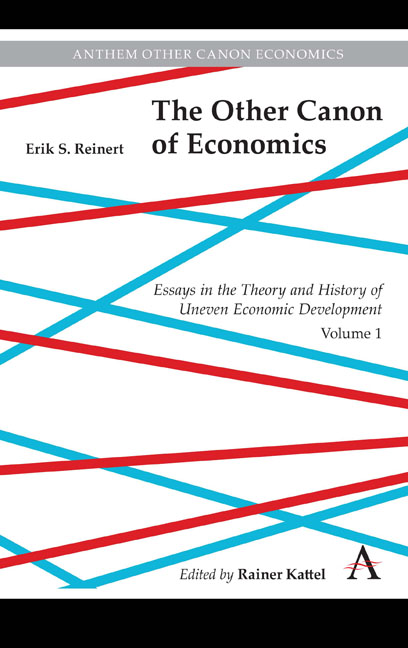Book contents
- Frontmatter
- Dedication
- Contents
- Introduction
- Chapter 1 Catching-up from Way Behind. A Third World Perspective on First World History
- Chapter 2 Recent Trends in Economic Theory — Implications for Development Geography
- Chapter 3 A Schumpeterian Theory of Underdevelopment - A Contradiction in Terms?
- Chapter 4 Competitiveness and Its Predecessors - A 500-Year Cross-national Perspective
- Chapter 5 Diminishing Returns and Economic Sustainability: The Dilemma of Resource-based Economies under a Free Trade Regime
- Chapter 6 Economics: ‘The Dismal Science’ or ‘The Never-ending Frontier of Knowledge’? On Technology, Energy and Economic Welfare
- Chapter 7 Production Capitalism vs. Financial Capitalism – Symbiosis and Parasitism. An Evolutionary Perspective and Bibliography
- Chapter 8 Globalization in the Periphery as a Morgenthau Plan: The Underdevelopment of Mongolia in the 1990s
- Chapter 9 Increasing Poverty in a Globalized World: Marshall Plans and Morgenthau Plans as Mechanisms of Polarization of World Incomes
- Chapter 10 An Early National Innovation System: The Case of Antonio Serra’s 1613 Breve Trattato
- Chapter 11 Innovation Systems of the Past: Modern Nation-States in a Historical Perspective. The Role of Innovations and of Systemic Effects in Economic Thought and Policy
- Chapter 12 The Other Canon: The History of Renaissance Economics
- Chapter 13 Benchmarking Success: The Dutch Republic (1500–1750) as Seen by Contemporary European Economists
- Chapter 14 Mercantilism and Economic Development: Schumpeterian Dynamics, Institution Building and International Benchmarking
- Chapter 15 Development and Social Goals: Balancing Aid and Development to Prevent ‘Welfare Colonialism’
Chapter 15 - Development and Social Goals: Balancing Aid and Development to Prevent ‘Welfare Colonialism’
Published online by Cambridge University Press: 13 April 2024
- Frontmatter
- Dedication
- Contents
- Introduction
- Chapter 1 Catching-up from Way Behind. A Third World Perspective on First World History
- Chapter 2 Recent Trends in Economic Theory — Implications for Development Geography
- Chapter 3 A Schumpeterian Theory of Underdevelopment - A Contradiction in Terms?
- Chapter 4 Competitiveness and Its Predecessors - A 500-Year Cross-national Perspective
- Chapter 5 Diminishing Returns and Economic Sustainability: The Dilemma of Resource-based Economies under a Free Trade Regime
- Chapter 6 Economics: ‘The Dismal Science’ or ‘The Never-ending Frontier of Knowledge’? On Technology, Energy and Economic Welfare
- Chapter 7 Production Capitalism vs. Financial Capitalism – Symbiosis and Parasitism. An Evolutionary Perspective and Bibliography
- Chapter 8 Globalization in the Periphery as a Morgenthau Plan: The Underdevelopment of Mongolia in the 1990s
- Chapter 9 Increasing Poverty in a Globalized World: Marshall Plans and Morgenthau Plans as Mechanisms of Polarization of World Incomes
- Chapter 10 An Early National Innovation System: The Case of Antonio Serra’s 1613 Breve Trattato
- Chapter 11 Innovation Systems of the Past: Modern Nation-States in a Historical Perspective. The Role of Innovations and of Systemic Effects in Economic Thought and Policy
- Chapter 12 The Other Canon: The History of Renaissance Economics
- Chapter 13 Benchmarking Success: The Dutch Republic (1500–1750) as Seen by Contemporary European Economists
- Chapter 14 Mercantilism and Economic Development: Schumpeterian Dynamics, Institution Building and International Benchmarking
- Chapter 15 Development and Social Goals: Balancing Aid and Development to Prevent ‘Welfare Colonialism’
Summary
‘… just as we may avoid widespread physical desolation by rightly turning a stream near its source, so a timely dialectic in the fundamental ideas of social philosophy may spare us untold social wreckage and suffering.’
Herbert S. Foxwell, Cambridge economist, 1899The Millennium Development Goals (MDGs) are noble goals for a world sorely in need of urgent action to solve pressing social problems. They rest, however, upon completely new principles whose long-term effects are neither well thought through nor well understood. In this chapter, I shall attempt to explain why the MDGs do not represent good social policy in the long run.
One novelty of the MDG approach lies in the emphasis on foreign financing of domestic social and redistribution policies rather than on domestic financing by the developing countries themselves. Disaster relief, which used to be of a temporary nature, now finds a more permanent form in the MDGs. In countries where more than 50 per cent of the government budget is financed by foreign aid, huge additional resource transfers are being planned. This raises the question of the extent to which this approach will put a large number of nations permanently ‘on the dole’, a system similar to ‘welfare colonialism’, which will be discussed at the end of the chapter.
The pursuit of the MDGs may appear as if the United Nations institutions have abandoned the effort to treat the causes of poverty and have instead concentrated on attacking its symptoms. In this chapter, I shall argue that palliative economics has, to a considerable extent, taken the place of development economics. Indeed, the balance between development economics (radically changing the productive structures of poor countries) and palliative economics (easing the pains of economic misery) is key to avoiding long-term negative effects.
How we used to deal with problems of development
In less than one generation, a stark contrast has emerged between the type of economic understanding underlying the Marshall Plan, on the one hand, and the type of economic theory behind today's multilateral development discourse and the Washington institutions, on the other. The Marshall Plan grew out of recognition of the flaws of its precursor, the Morgenthau Plan.
- Type
- Chapter
- Information
- The Other Canon of EconomicsEssays in the Theory and History of Uneven Economic Development, pp. 475 - 499Publisher: Anthem PressPrint publication year: 2024

